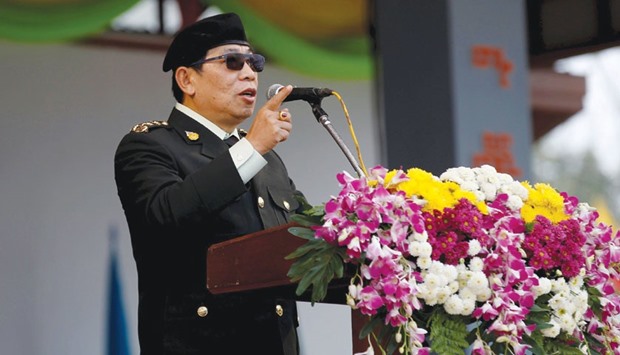
Lt. Gen. Yawd Serk, chairman of the Restoration Council of Shan State gives a speech during a military parade celebrating the 69th Shan State National Day at Loi Tai Leng.
Speaking to 1,000 of his soldiers at a mountain base on Myanmar’s border with Thailand, the leader of a powerful ethnic armed group called on other rebels to join government-led peace talks and appealed for unity among the country’s minorities.
“Stop shooting and come to the negotiation table,” said Yawd Serk, who leads the 6,000-strong Shan State Army-South (SSA-S). “Whether it is trustworthy or not, we should grab the chance to talk.”
Ending decades of ethnic conflict is one of the biggest challenges for the incoming government of Nobel Peace Prize laureate Aung San Suu Kyi, who has made it her first priority.
But although Yawd Serk signed a government-brokered ceasefire deal last October, in a much-needed boost to the peace process of outgoing President Thein Sein, over the winter some of his troops have been fighting another ethnic group for control of remote swathes of eastern Myanmar.
That a contingent of Yawd Serk’s soldiers could travel unchallenged some 300km north to fight the Ta’ang National Liberation Army near the border with China shows how little control Suu Kyi’s government will have over Myanmar’s wild hinterlands at the start of its five-year term on April 1.
It also highlights the shifting loyalties and complexities that have made peace so elusive in the ethnic conflicts that have plagued the former Burma since World War Two.
Yawd Serk has courted international businesses since signing the ceasefire and recently joined a study trip to Switzerland. He is not willing to lay down his arms, however, or give up influence over a region rich in gold, timber and gemstones.
“Disarming is impossible,” said Yawd Serk, flanked by a heavily armed security detail including a man who said he was a former member of US special forces.
The SSA-S leader was speaking as thousands of Shan from Myanmar and Thailand flooded his windswept headquarters at Loi Tai Leng, perched on a ridge a few hundred metres from the Thai border, last Sunday to mark Shan National Day.
Visitors pitched tents on the mountainside. The base’s main thoroughfare, a dirt road straddling Thailand and Myanmar, was lined with carnival games, noodle stands and mobile phone booths selling Thai mobile phone SIM cards.
“We are not soldiers with guns but we help as much as we can,” said Lar Yen, 33, selling Shan souvenirs with the proceeds donated to the SSA-S.
One of the new cadets was Sai Sai Wan, 28, who, like many soldiers, said he joined the group to protect Shan heritage and shared its deep distrust of the Myanmar military that ruled the country with an iron fist for decades.
“We need to protect our people and our country. We don’t want the Burmese army controlling our future,” he said.
He signed a five-year contract in December and will be paid $11 a month for his service.
While ethnic groups carry many grievances rooted in decades of discrimination by a government and military dominated by the Bamar majority, their vested economic interests, many illicit, and human rights abuses make achieving peace a daunting task.
Officers in Yawd Serk’s militia say it has given up forced recruitment from villages and towns, though the UN Secretary General still lists the SSA-S as “persistent perpetrators” in the recruitment and use of children in its ranks.
The SSA-S emerged under Yawd Serk’s command in 1996 as a breakaway faction of a narco-army led by heroin kingpin Khun Sa, who signed a ceasefire with the then-ruling junta.
It has been accused of continued involvement in the drug trade along the borders with Thailand and China, an allegation its members reject.
To fund its operations, the group collects “taxes” on everything from mining and logging operations to cars driven by residents of towns under its command.
Asked what would happen if someone refused to pay, one group member said: “You are going to have some trouble.”
